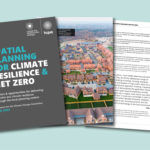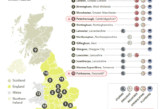New research released today (19th July 2023) shows that a lack of clarity about central government policy is undermining the ability of local planners to mitigate and adapt to climate change.
The Spatial Planning for Climate Resilience and Net Zero report, commissioned by the Climate Change Committee (CCC) and produced by the Centre for Sustainable Energy (CSE) and the Town and Country Planning Association (TCPA), found the planning system should be a vital tool for driving carbon reductions across the board, but it’s not living up to its potential.
The report reveals planning is not recognised as a key public policy tool at national government level, where a deep-rooted institutional culture has resulted in the planning system being seen as a problem, instead of a solution. This has resulted in:
- The de-prioritisation of national planning policy development.
- The absence of a holistic approach to tackling climate change.
- The failure to provide political prioritisation for the role of planning in addressing climate policy objectives arising from the Climate Change Act.
- A chronic lack of resources locally.
The report exposes the glaring disparity between the potential power of the planning system to create long-term, location-specific plans that integrate energy and resilience strategies with other public policy objectives, and the current reality on the ground.
This report reveals that the planning system is not aligned with our strategy to meet net zero. In fact, it is making things worse. The report found that most local plans are not fit for purpose when considering climate change. No local plan was identified as being fully aligned with our UK net zero pathway. Outside of flood risk, guidance on climate adaptation (for instance resilience to heatwaves) is insufficiently developed. Pages 37 – 38 of the report give some stats about local plans are, for example:
- None of the local authority respondents identified that their adopted local plan was fully aligned with the scale of emission reduction required to reach net zero. Almost a third (28%) said that their local plan was ‘not at all aligned’ with this target. 8% said their local plan was ‘mostly aligned’, with 24% identifying as ‘somewhat aligned’ and 33% as ‘slightly aligned’.
- Only a quarter (26%) of local plans addressed embodied carbon. None had a policy in place to monitor embodied carbon from new development (17% were in the process of developing one).
- 29% of local authorities reported that they did not know what their baseline carbon emissions were for their area.
- A third of local authorities (31.3%) said that they were unable to quantify the carbon emissions that their local plan would create.
- 22% of respondents said that their local plan did not contain a renewable energy policy. Of those that did, only 13% included a defined target for renewable energy generation, only 11% had identified suitable areas for wind turbines, and only 4% had identified suitable areas for solar farms. None had included any criteria for battery storage schemes.
With its unique and influential role, planning could become the driving force in framing practical, place-based pathways to a zero carbon future. By shaping cost-effective policy choices, engaging in conversations with local communities, and delivering renewable energy projects, planning holds the key to identifying sustainable locations and designing communities that support healthy and low carbon transport options.
The Spatial Planning for Climate Resilience and Net Zero report confirms that by placing climate change at its core, planning reform could become crucial to ensuring the planning system itself becomes a catalyst for tackling, rather than fuelling, the climate crisis.
The report draws its conclusions from an analysis of national and local planning policy, consisting of an evidence review; review of current national policy and guidance; survey of planning practitioners; four in-depth case studies and three stakeholder roundtable events.
Containing over 22 recommendations, the report looks at improving the planning system’s ability to promote climate mitigation and adaptation. These recommendations include immediately revoking the 2015 Written Ministerial Statement (WMS) on Plan-making, which led to the watering down of ambitious plans for a ‘garden-village’ in West Oxfordshire to be net zero.
Neil Best, Senior Planner for Net Zero at the Centre for Sustainable Energy said: “The planning system has huge potential as a solution to complex challenges around climate change. However, this report reveals a glaring disparity between what is actually climate-conscious planning and what is actually being implemented now.
“The cause of this lies not with the intrinsic capability of the planning system, but in a series of defined legal, policy, skills and resource issues, many of which stem from a lack of clarity at national level on the priority that should be placed on climate change.
“It’s not all bad news. The report showcases inspiring case studies from innovative authorities overcoming these barriers and setting examples of best practice. But these are few and far between and these examples are delivering change despite national policy, rather than because of it. Its clear planners want to tackle these challenges, but the current policy situation is holding us back from fully realising what the planning system can achieve.”
Celia Davis, Projects and Policy Manager, TCPA commented: “Our research revealed that even where local authorities are trying to be ambitious and address climate change through their local plans, their efforts are frustrated by unclear national policy and inconsistent decision making by the Planning Inspectorate. It also highlights that the current planning system is ill equipped to deal with the multiple challenges of adapting to climate change. The planning system must change so that local communities are able to plan for a resilient and net zero future, and our report makes clear recommendations for how this can be achieved.”
When introducing the Climate Change Committee’s (CCC) 2023 Progress Report, Lord Deben Chairman of the CCC said: “The planning system must not prevent the rollout of infrastructure needed to deliver net zero, and it must ensure that all planning decisions give full regard to the imperative of net zero, to which the Government has committed itself. For too long, we have been building homes and infrastructure that will need to be retrofitted.” (5.56 minutes into this video)
Quotes from planners and other key industry stakeholders that appeared in the report:
“The planning system is a major tool for shaping the future of the built environment and we’re not using it, basically, at all, to help deliver net zero.” (Roundtable participant)
“I think we’ve almost given up on government and just going for it ourselves really, that’s the only way to do it.” (Roundtable participant)
“The planning system must be reformed to ensure it plays its full part in contributing to net zero and in empowering local planning authorities to make policies and decisions in line with net zero.” (Survey respondent)
“At present there is still too much ambiguity about the priority that needs to be assigned to policies addressing climate change, and how this be factored into decision making on individual applications when weighed up against other priorities. This leaves a lot of the responsibility on the shoulders of local authorities whilst leaving too much uncertainty in how they can do this.” (Survey respondent)
“The political commitment does not exist meaning that the resources and skills are often not made available.” (Survey respondent)










